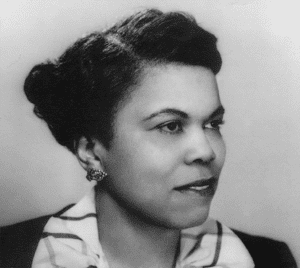Black History Month Spotlight: Estelle Massey Osborne
Estelle Massey Osborne was a trailblazing healthcare hero who helped change the face of nursing as we knew it. As a nurse, educator, and leader, she worked tireless to open healthcare up to women of color at a time when racial lines prevented most Black women from holding top positions in their fields. To say that she deserves to be honored is an understatement, so let’s take some time to learn about her life and legacy this Black History Month.

To be the first at anything is an accomplishment. Estelle Osborne’s vision, fearlessness, and determination allowed her to be the first in many areas. At the time Osborne was applying to nursing school, only 14 of the nation’s 1,300 schools for nursing were open to Black applicants. Yet for Osborne, racial barriers were only meant to be broken. She received the first scholarship awarded to a Black nurse by the Julius Rosenwald Fund in 1928. She entered nursing school in St. Louis, where she developed a passion for bedside care, particularly obstetrics. She was then accepted to Columbia University in New York, where she became the first Black nurse to receive a master’s degree in nursing education in 1931, a significant milestone that would impact future generations of nurses.
In addition to earning her master’s, she was named as a consultant to the National Nursing Council for War Service during World War II. During this time, in an effort to further the progress of those seeking higher education in nursing, she worked with nursing schools to eliminate discriminatory policies.
Osborne defied a system built on racism to help provide quality healthcare for Black Americans.
She went to work for the Rosenwald Fund as a researcher, studying rural life in the deep South and investigating ways to bring better health education and service to rural Black communities.
In 1934, she took on the presidency of the National Association of Colored Graduate Nurses, which was headquartered in New York City. There, she forged strategic relations with White-exclusive nursing institutions like the American Nurses Association (ANA) and intensely lobbied them to accept Black nurses, particularly those in the South. She also fostered programs to develop post-nursing school opportunities for nurses of color. When she left the post in 1939, she had increased the association’s membership more than five-fold, from 175 to 947.
In 1940, Osborne became the first Black superintendent of nurses at the storied Homer G. Phillips Hospital in St. Louis, the largest exclusively Black, city-operated general hospital in the world, which served over 70,000 people. She was also the first Black woman director of its nursing school.
In 1959 the NYU Department of Nursing named Osborne the “Nurse of the Year.” In 1984, three years after she died, Osborne was inducted into the ANA Hall of Fame, in recognition of her outstanding achievements. Both NYU Meyers and the Nurses Educational Fund have created and named scholarships in her honor.
Osborne’s legacy lives on in each and every nurse who has overcome limitations based on race or gender to further themselves in the pursuit of delivering quality patient care.
Honor and celebrate her work by sharing her story with a nurse close to you this Black History Month.